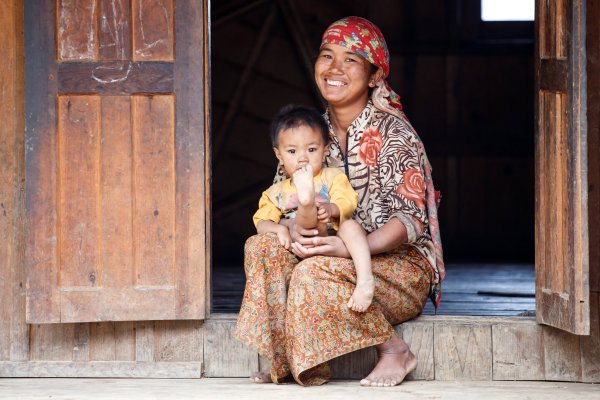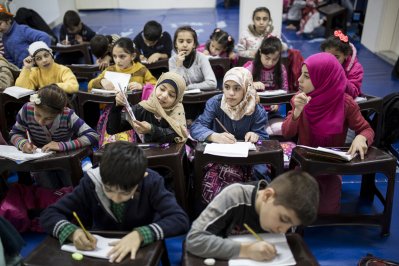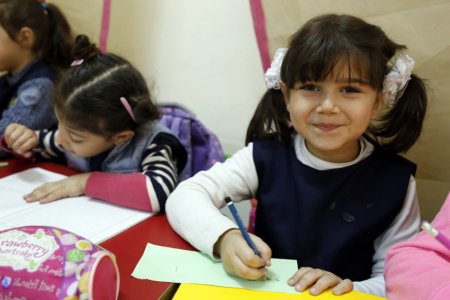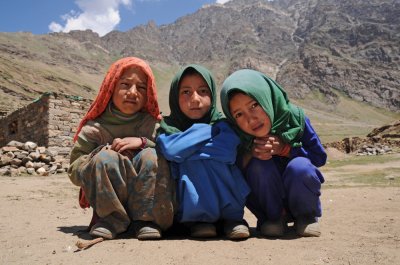Sally Moyle, Chief Executive, Care Australia
Q 1. What is your response to the 2018 Budget position on foreign Aid?
This Budget decision – to freeze the cost of living increases in the international development and aid program for yet another year – is frankly mean. In the face of billions of dollars of unexpected revenue, it was unnecessary for the Australian Government to grasp another $141 million from the aid program in this way. While it doesn’t mean much to the Budget bottom line, it could mean life or death, or at least quality of life, for women and men, boys and girls, in our region. There are some good points in the aid budget, to refocus more on the Pacific and on humanitarian response, but all these decisions are made within the same, mostly flat, budget envelope. It is very disappointing.
…it could mean life or death, or at least quality of life, for women and men, boys and girls, in our region.
Q 2. The Australian Government has previously taken a strong position in tying a percentage of Aid spending to programs that support women and girls. What do you think the ramifications of the 2018 Budget will be for programs to support the economic empowerment, safety from violence, and political participation of women and girls in our region?
Gender inequality remains one of the greatest impediments to peace, prosperity and stability in our region, and is the most prevalent human rights abuse globally. The aid program recognises this and requires all investments, no matter whether they focus on education, infrastructure or agriculture, to ensure they are able to deliver progress towards gender equality. This is important and will not change through this Budget process. But of course, the need is much greater than Australia’s stagnating aid program can respond to.

Q 3. What do you believe the Australian government should be doing to better support women and girls in our region?
We know that gender inequality is not a problem for women to solve alone, but too often we talk only about working with women and girls. Rather, we need also to support men and boys to understand their role – and responsibility – in creating a world where women and men can flourish together, and to support institutions and governments to create the conditions for equality. The aid program should do better at this. By 2021, for every dollar we spend on aid, we will spend $11 on defence. For the price of a single submarine, we could fund the entire aid program for a year.
With the aid program budget under additional pressure, Australia will not be able to help as we should. We are heading to new records with the lowest ever proportion of aid to Gross National Income. By 2021, for every dollar we spend on aid we will spend $11 on defence. For the price of a single submarine, we could fund the entire aid program for a year. So I would like to see Australia prioritise a gender equality focussed aid program over military spending – not only is it the right thing to do, but it would more to create a prosperous, peaceful world.

Susanne Legena, CEO, Plan International Australia

This is a cruel blow …
Q 1. What is your response to the 2018 Budget position on foreign Aid?
It’s not ideal. Because the budget won’t keep up with inflation, we’re looking at a very real $141 million loss to our sector over four years. This is a cruel blow that comes on top of years and years of consecutive brutal cuts to Australian aid. While it’s positive to see a focus on humanitarian assistance and support in the Pacific region, let’s be clear that this doesn’t actually represent an increase. This is just shifting money from one place to another.
It seems senseless to invest in weapons when children are not only dying in wars, but being actively targeted.
It’s beyond disappointing that the Federal Government is planning to divert $3.8 billion to arms manufacturers. That’s the equivalent of Australia’s entire annual aid budget. It seems senseless to invest in weapons when children are not only dying in wars, but being actively targeted.
The sad fact is that after years of cuts, the Australian foreign aid budget is now at its lowest level on record. This has serious repercussions. Over the past five years, Plan International Australia has been forced to discontinue or outright cancel projects in Bangladesh, Zambia, Papua New Guinea, Solomon Islands, Fiji, Tonga, Kiribati, Vanuatu, Cambodia, Uganda, Ethiopia, Myanmar, Vietnam and Indonesia.
This is not a time to be apathetic about aid or to treat it as an afterthought.
This is not a time to be apathetic about aid or to treat it as an afterthought. Millions in Eastern Africa are on the precipice of starvation as conflict flares once more in South Sudan and crops fail after another year of drought. The world’s children need us and as a wealthy country with kind values, we have a duty to step up and help.
Q 2. The Australian Government has previously taken a strong position in tying a percentage of Aid spending to programs that support women and girls. What do you think the ramifications of the 2018 Budget will be for programs to support the economic empowerment, safety from violence, and political participation of women and girls in our region?
This year’s budget contained a welcome commitment of $55 million to the Gender Equality Fund to invest in initiatives that advance gender equality globally. However, there is a frustrating lack of transparency in reporting on gender spending in aid and development. For example, we don’t know how much of the current fund reaches girls aged 10 to 19 and what impact is has on their lives.
Australia still struggles to meet its target of 80% investments on gender equality
What we do know is that Australia still struggles to meet its target of 80% investments on gender equality and that we must do more to ensure that aid is driving change for women and girls globally.

Q 3. What do you believe the Australian government should be doing to better support women and girls in our region?
As an organisation advancing the rights of children and especially girls, we believe it’s crucial that the government increase their focus on achieving gender equality for the next generation of women.
Adolescent girls aged 10 to 19 hold the key to lifting their families out of poverty and transforming their country’s economies
Adolescent girls aged 10 to 19 hold the key to lifting their families out of poverty and transforming their country’s economies and yet they are virtually ignored in our policy and funding. Our gender spending needs to have more impact on girls’ lives.
One way to achieve this is to develop an action plan specifically focussed on adolescent girls, outlining the targeted investments that will educate and empower our next generation of women.
The government should also earmark at least 15% of the Gender Equality Fund for adolescent girls to ensure that our gender spending truly improves the lives of girls.

Caroline Lambert, Director Research, Policy and Advocacy, IWDA

Q 1. What is your response to the 2018 Budget position on foreign Aid?
Australians have always been generous to those in our neighbourhood, giving both at times of great need and on an ongoing basis. And, around the world, countries who have a tougher economic climate than Australia are meeting their commitment to give 0.7% of their gross national income to overseas development assistance, or are doing much better than Australia at working towards it. So the decision to cut $141 million from foreign aid over the forward estimates seems to be out of step with both the Australian community and our global peers. It means that the aid budget has now been cut by a total of one third. You cannot do this without having a profound impact on how our aid program supports people to build better lives.
You cannot do this without having a profound impact on how our aid program supports people to build better lives.
Q 2. The Australian Government has previously taken a strong position in tying a percentage of Aid spending to programs that support women and girls. What do you think the ramifications of the 2018 Budget will be for programs to support the economic empowerment, safety from violence, and political participation of women and girls in our region?
Gender equality has a central role in achieving peace and prosperity. There is no question that this Government recognises that: the Foreign Policy White Paper of last year was very clear that, without gender equality, Australia will not be able to achieve our foreign policy objectives. They’ve said, time and again, not only is gender equality the right thing to do, it is the smart thing to do.
This Government has committed to gender equality as a cornerstone of the aid program: they’ve set targets that 80% of their investments address gender issues. However, the cuts to foreign aid mean that the pie is shrinking. In real terms, when the development budget is cut, there is less money for gender equality.
They’ve said, time and again, not only is gender equality the right thing to do, it is the smart thing to do
From a women, peace and security perspective, this budget puts in place a $3.8 billion loan scheme to bolster our role as a global arms dealer. The defence budget is on track to grow to 2% of Gross National Income. And yet, it is still unclear what funding will be available to support the Second National Action Plan on Women, Peace and Security. Our partners, from Bougainville to Myanmar, from Cambodia to Fiji, know the vital importance of women being at the peace table and rebuilding communities destroyed by conflict. We need to do more to support their work.

Q 3. What do you believe the Australian government should be doing to better support women and girls in our region?
For over 30 years IWDA has proudly worked with feminist and women’s rights organisations across the Pacific and Asia. Across four decades, and in seventy countries, the mobilisation of women’s organisations and movements was a more critical factor in tackling violence against women than a nation’s income, progressive political parties, or the representation of women in politics. This year, we asked the Australian Government to join with other global gender equality leaders to recognise the vital role of women’s rights organisations, and to increase the funding that they receive. This is particularly important in the Pacific region where only 6% of the global funders for gender equality give to the Pacific.
Increasing funding for sexual and reproductive health and rights is also critical.
Increasing funding for sexual and reproductive health and rights is also critical. Complications during pregnancy and childbirth are a leading cause of maternal death, and many of these deaths are entirely preventable. Our family planning funding Building our funding for family planning to $50 million would go a long way to fixing this problem.
Finally, working on a stronger integration of gender in foreign policy is important. This year’s budget papers flagged the importance of integrating, for example, gender equality into social and environmental safeguards in infrastructure investments. But more is needed, particularly when it comes to trade and investment: trade agreements affect women and men differently, and our trade policies, including aid for trade policies, need to take that into account. Good integration of gender analysis in Australia’s development cooperation, foreign policy, trade policy – indeed across government expenditure through gender responsive policy analysis and budgeting – would help ensure that these implications are visible and would improve the quality of the policies and programs.





